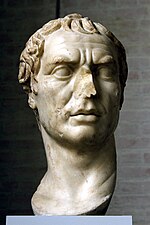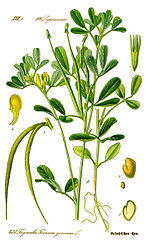Marcus Porcius Cato (/ˈkeɪtoʊ/, KAY-toe; 234–149 BC), also known as Cato the Censor (Latin: Censorius), the Elder and the Wise, was a Roman soldier, senator...
53 KB (6,788 words) - 17:19, 25 October 2024
Look up Cato, cato, or CATO in Wiktionary, the free dictionary. Cato typically refers to either Cato the Elder or Cato the Younger, both of the Porcii...
4 KB (585 words) - 19:47, 2 November 2024
Marcus Porcius Cato can refer to: Cato the Elder (consul 195 BC; called "Censorinus"), politician renowned for austerity and author Cato the Younger (praetor...
604 bytes (105 words) - 23:36, 14 October 2023
Marcus Porcius Cato Uticensis ("of Utica"; /ˈkeɪtoʊ/, KAY-toe; 95 BC – April 46 BC), also known as Cato the Younger (Latin: Cato Minor), was an influential...
89 KB (12,069 words) - 08:08, 15 November 2024
Cato Maior de Senectute ("Cato the Elder on Old Age") is an essay written by Cicero in 44 BC on the subject of aging and death. To lend his reflections...
5 KB (635 words) - 19:31, 25 October 2024
of 2,443. The town is named after Cato the Elder, a Roman statesman. The name was assigned by the surveyors of the Military Tract, and is one of many...
12 KB (950 words) - 17:21, 4 May 2024
as simply "Cato". In the Middle Ages it was assumed the work had been written by Cato the Elder, or even Cato the Younger. Cato the Elder was assumed...
7 KB (928 words) - 14:02, 14 August 2024
Scipio Africanus (redirect from Scipio Africanus the Elder)
especially Cato the Elder, who hated him deeply. In 187 BC, he was tried in a show trial alongside his brother for bribes they supposedly received from the Seleucid...
63 KB (7,769 words) - 14:52, 13 November 2024
Carthago delenda est (category Cato the Elder)
pronounced by Cato the Elder, a politician of the Roman Republic. The phrase originates from debates held in the Roman Senate prior to the Third Punic War...
19 KB (2,073 words) - 02:32, 25 November 2024
Marcus Porcius Cato Licinianus (191–152 BC) was son of Cato the Elder by his first wife Licinia, and thence called Licinianus, to distinguish him from...
7 KB (992 words) - 20:21, 27 February 2024
Cato Salonianus (born c. 154 BC) was the younger son of Cato the Elder, and grandfather of Marcus Porcius Cato Uticensis, also known as "Cato the Younger"...
3 KB (402 words) - 20:13, 27 February 2024
The dessert is mentioned in classical texts such as the Greek poems of Archestratos and Antiphanes, as well as the De agri cultura of Cato the Elder....
14 KB (1,409 words) - 10:22, 21 October 2024
Dionysius cites, among others, the histories of Pictor, Lucius Calpurnius Piso, Cato the Elder, Lucius Cincius Alimentus. The first book of Dionysius' twenty-volume...
32 KB (3,685 words) - 20:58, 16 November 2024
Porcia gens (redirect from Porcius Cato)
illustrious was Cato. Other cognomina are found under the Empire. The surname Cato is said to have been bestowed upon Cato the Elder in consequence of...
19 KB (2,466 words) - 15:39, 29 January 2024
from the tomb of Tutankhamen. Cato the Elder lists fenugreek with clover and vetch as crops grown to feed cattle. In one first-century A.D. recipe, the Romans...
20 KB (2,198 words) - 09:50, 16 November 2024
was bidding at auction. Livia then married Marcus Porcius Cato, a grandson of Cato the Elder. They had two children: Porcia, born circa 96 BC, married...
7 KB (709 words) - 21:44, 21 June 2024
political actor. The term is most famously associated with three noted orators of the ancient world: Demosthenes of ancient Athens, Cato the Elder and Cicero...
4 KB (476 words) - 17:15, 18 April 2024
indicating that the Etruscans cultivated the vine. In Roman times Lambrusco was highly valued for its productivity and high yields, with Cato the Elder stating...
9 KB (1,075 words) - 16:20, 15 August 2024
Amurca (category Wikipedia articles incorporating a citation from the 1728 Cyclopaedia)
numerous purposes, as first described by Cato the Elder in De Agri Cultura, and later by Pliny the Elder. Cato mentions its uses as a building material...
3 KB (276 words) - 12:57, 25 August 2024
De agri cultura (redirect from On Agriculture (Cato))
Roman agriculture by Cato the Elder. It is the oldest surviving work of Latin prose. Alexander Hugh McDonald, in his article for the Oxford Classical Dictionary...
7 KB (914 words) - 16:55, 9 August 2024
forms an important source on Roman agriculture, together with the works of Cato the Elder and Marcus Terentius Varro, both of which he occasionally cites...
17 KB (1,865 words) - 17:07, 26 October 2024
This article concerns the period 189 BC – 180 BC. Cato the Elder criticizes the consul Marcus Fulvius Nobilior for giving awards to Roman soldiers for...
540 bytes (2,619 words) - 10:56, 22 January 2022
step from the intemperance of Liber pater to the forbidden things of Venus". He cites the much respected arch-conservative Cato the elder as his source...
71 KB (9,501 words) - 02:53, 18 November 2024
Roman historiography (redirect from Views on the Rise of Rome)
Classical Latin until the 2nd century BCE with the Origines by Cato the Elder. Contemporary Greek historians such as Polybius wrote about the rise of Rome during...
41 KB (6,362 words) - 19:11, 23 November 2024
Agriculture in ancient Rome (redirect from Agriculture in the Roman Empire)
the people in the cities with food. The main texts of the Greco-Roman agricultural tradition are mostly from the Roman agronomists: Cato the Elder's De...
34 KB (4,649 words) - 16:22, 24 November 2024
Valerian and Porcian laws (category Cato the Elder)
civium): perhaps proposed by M. Porcius Cato (Cato the Elder), consul in 195 BC and 184 BC, it extended the right to provocatio against flogging. Lex...
7 KB (929 words) - 13:28, 1 November 2024
first century BC. Cato was the son of Marcus Porcius Cato Salonianus, the son of Cato the Elder by his second wife, Salonia. Cato Salonianus was born in 154...
6 KB (710 words) - 15:47, 13 February 2024
Plutarch, Cato the Elder, 24.3 Plutarch, Cato the Elder, 24.4. Plutarch, Cato the Elder, 24.4 Plutarch, Cato the Elder, 24.5 Plutarch, Cato the Elder, 24.6...
2 KB (211 words) - 20:21, 27 February 2024
Taleggio cheese (category Cheeses with designation of origin protected in the European Union)
Cicero, Cato the Elder, and Pliny the Elder all mentioning it in their writings. The cheese was solely produced in the Val Taleggio until the late 1800s...
5 KB (422 words) - 03:58, 27 September 2024
Nicomedes II overthrows his father Prusias II as king of Bithynia. Cato the Elder, Roman statesman (b. 234 BC) Prusias II, Greek king of Bithynia (b....
2 KB (241 words) - 18:02, 13 January 2021


















